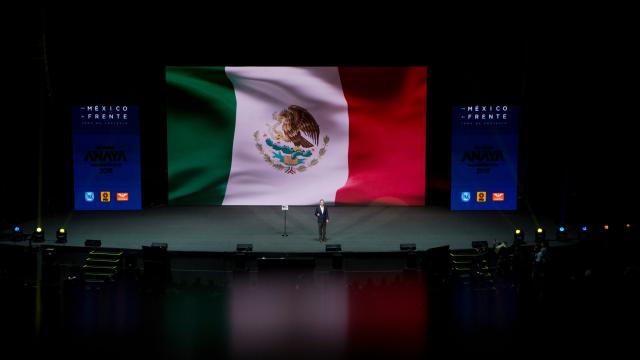Facebook is taking a huge amount of heat this week amid mounting scandals over its allegedly reckless handling of user data, vulnerability to propaganda and disinformation efforts, and whether or not its internal response to those issues was mostly concerned with shoving those problems under a rug. The company’s stock has taken a double-digit hit – even if many market analysts say it is likely to recover – and pressure is mounting for some kind of consequences or regulatory response from politicians and the public.
Mexican presidential candidate Ricardo Anaya speaks at a rally in February. Photo: AP
So it’s no surprise that the company is testing out a number of different types of damage control. Per Bloomberg, Facebook is now taking out full-page ads in major Mexican newspapers such as El Financiero warning the public about “Fake News” in the leadup to the upcoming 1 July 2018 federal elections there. The ads run with the title “Tips to Detect Fake News”, and are accompanied by a Facebook logo in the corner.
Bloomberg wrote:
The Menlo Park, California-based company has worked with First Draft, a nonprofit journalistic coalition, to come up with tips to detect misinformation.
In the newspaper ads on Tuesday, the company lists 10 tips, such as “Doubt the headline,” “Check the source” and “Carefully observe the URL.” At the bottom of the page, a banner reads, in Spanish, “Together, we can limit the diffusion of fake news.”
This is better than nothing. But warning people about “fake news” does not address the problem. For one, Facebook’s token efforts to actually crack down on that genre of content have repeatedly failed, which might have something to do with the fact that the entire platform is designed to profit from juicing engagement with minimal human oversight. These factors make Facebook a giant shout-box ripe for exploitation by people with ill intentions.
Two, “fake news” is a deliberately nebulous term that shifts the buck to anyone involved in the business of “news” when the real issue is Facebook’s specific impact on that news industry. The reality is that Facebook has incentivised the creation of a lucrative new media ecosystem that is slowly but surely choking the life out of legacy media and that rewards lying and propaganda. It may like to insist that it isn’t a media business, but the way it has muscled its way to the top of the media landscape simply by controlling the traffic spigot and the supply of advertising dollars is undeniable.
It’s obviously reductive to attribute the outcome of any election specifically to Facebook. But it’s also fair to say that things such as alleged Russian propagandists reaching up to 126 million users before the 2016 elections in the US had some kind of impact, even if it isn’t really quantifiable, and Facebook mostly seems interested in limiting its culpability for it. To put it another way, the fake news is coming from within the house.
